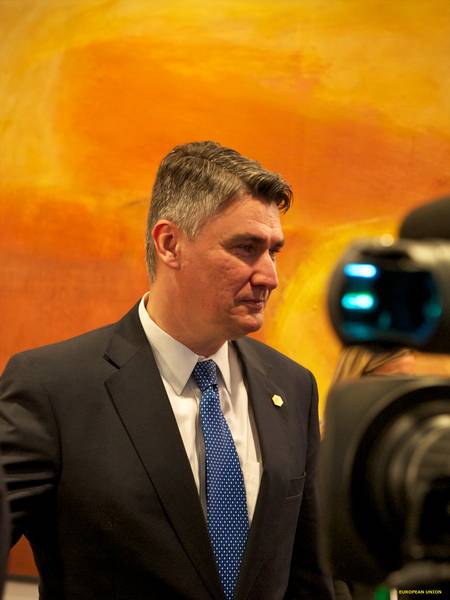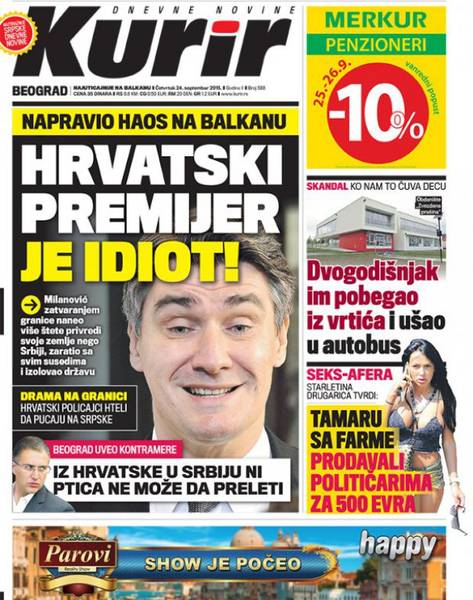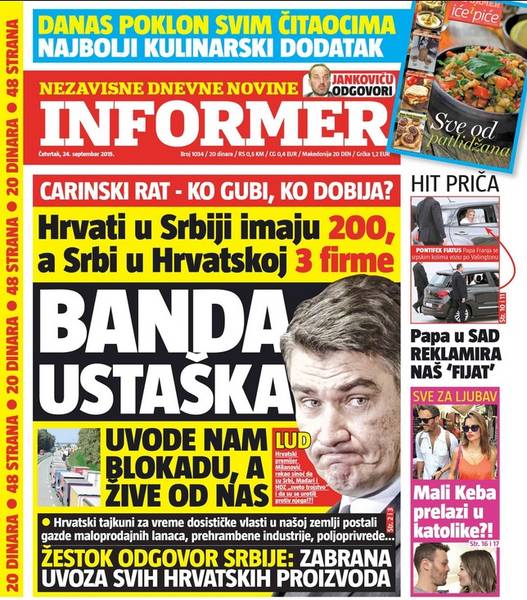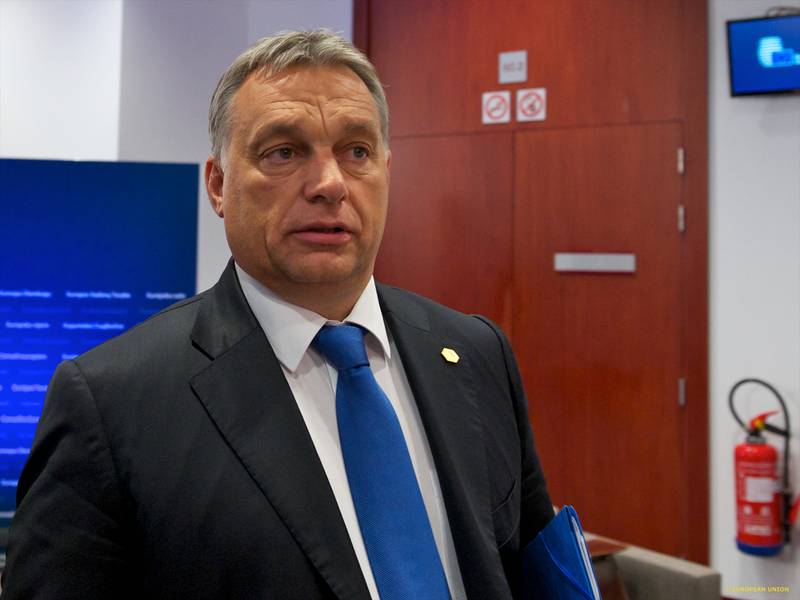Elections at Any Cost
Adelina Marini, September 25, 2015
 A real trade war broke out between Croatia and Serbia because of the refugee crisis and Hungary’s behaviour. The border between Croatia and Serbia now is closed, now is open. It came all the way to requiring the intervention of the High Representative of the European Union for Foreign Affairs Federica Mogherini. That and more is part of pre-election moods in Croatia, where sometime this autumn (a definite date is not set yet) there are going to be parliamentary elections. From statements by key players in the campaign – Prime Minister Zoran Milanović, who leads the a centre-left coalition, Tomislav Karamarko, leader of the Patriotic coalition of right-wing, far-right, and centrist parties, and President Kolinda Grabar-Kitarović – you can see that in this campaign there will be nothing held sacred. Refugees, German Chancellor Angela Merkel, bilateral relations in the region and in the last several days the trade relations between Belgrade and Zagreb have fallen victims to the campaign.
A real trade war broke out between Croatia and Serbia because of the refugee crisis and Hungary’s behaviour. The border between Croatia and Serbia now is closed, now is open. It came all the way to requiring the intervention of the High Representative of the European Union for Foreign Affairs Federica Mogherini. That and more is part of pre-election moods in Croatia, where sometime this autumn (a definite date is not set yet) there are going to be parliamentary elections. From statements by key players in the campaign – Prime Minister Zoran Milanović, who leads the a centre-left coalition, Tomislav Karamarko, leader of the Patriotic coalition of right-wing, far-right, and centrist parties, and President Kolinda Grabar-Kitarović – you can see that in this campaign there will be nothing held sacred. Refugees, German Chancellor Angela Merkel, bilateral relations in the region and in the last several days the trade relations between Belgrade and Zagreb have fallen victims to the campaign.
Sorry, bro!
Tension between Serbia and Croatia began to rise when Hungary closed for real its border with Serbia, thus rerouting the refugee flow only through Croatia. A little later, when the situation at the Serbian-Hungarian border calmed down a little, Belgrade and Budapest shook hands and border crossings are fully open now. Furthermore, while the leaders of member states were gathering for a summit in Brussels, looking for a stable solution to the migrant-refugee problem, in Serbia Hungarian Foreign Minister Peter Szijjártó and Serbian PM Aleksandar Vučić opened a new plant for manufacturing of automotive cables. On this occasion Mr Szijjártó, who was mainly busy last week to criticise the Croatian government, said that Hungarian-Serbian friendship added new value during the refugee crisis.
In the recently warmed up relations between Belgrade and Budapest Zoran Milanović sees a union against Croatia. He began a war with Hungary first by starting an organised transportation of refugees mainly to the Hungarian-Croatian border, where Hungary in turn started to build the next wire fence. Later, he turned to Serbia and closed to freight transport the only open border crossing – Bajakovo. His Serbian colleague Vučić went mad and gave Croatia an ultimatum to open the borders, else contra-measures will be enforced. The Croatian Prime Minister insists Serbia to not direct the full refugee flow only through Croatia, but also let people through towards the border crossing Horgoš (with Hungary). “Until I see the axis Belgrade-Budapest functioning, the border will remain closed,” he said on Wednesday before the start of the European Council. He even turned the conversation in a cultural-civilisation direction by stating that conversations with Germans and Austrians are good, civil. Even conversations with Slovenian Prime Minister Miro Cerar are civilised.
 “They do not scream and raise ruckus, nor give ultimatums. This is Western Europe, where we belong, and this here is not Western Europe. This is where the HDZ (Croatian Democratic Union) belongs”, said Milanović, attacking his biggest opponent in the elections – the HDZ, led by the former boss of Croatian counter-intelligence, Tomislav Karamarko. On many occasions has Milanović accused Karamarko in “Balkanism”, trying to position himself and his government as Western European. Answering the transport restrictions Belgrade prohibited the entrance in Serbia of Croatian trucks and goods, followed by a reciprocal ban from the Croatian side. At the moment, no trucks and cars with Serbian registration can enter Croatia. Until Wednesday the ban was in place also for Serbian nationals, transported with vehicles of other nationality, but yesterday it was lifted.
“They do not scream and raise ruckus, nor give ultimatums. This is Western Europe, where we belong, and this here is not Western Europe. This is where the HDZ (Croatian Democratic Union) belongs”, said Milanović, attacking his biggest opponent in the elections – the HDZ, led by the former boss of Croatian counter-intelligence, Tomislav Karamarko. On many occasions has Milanović accused Karamarko in “Balkanism”, trying to position himself and his government as Western European. Answering the transport restrictions Belgrade prohibited the entrance in Serbia of Croatian trucks and goods, followed by a reciprocal ban from the Croatian side. At the moment, no trucks and cars with Serbian registration can enter Croatia. Until Wednesday the ban was in place also for Serbian nationals, transported with vehicles of other nationality, but yesterday it was lifted.
Serbian Minister of Labour Aleksandar Vulin called the shutdown of the Croatian border “racism” and Thursday front pages of Serbian tabloids, many of which are considered to be controlled by Aleksandar Vučić’s government, came out with downright vulgar headlines like “The Croatian PM is an idiot”, “Ustašan band”. After the changes of Thursday night Serbian PM Vučić announced he was not going to introduce new counter-measures, but will await the opening of the border. At one more emergency press-conference at noon on Thursday Croatian PM Zoran Milanović again reminded that he was sorry for Serbian citizens and businesses, but the fault for the current situation belongs entirely to their government. He criticised Serbian media as well by stating that in Croatia media are sceptical and do not believe everything the government says, while in Serbia media believe every word that comes from the government in Belgrade.
Despite the constantly rising pressure between Belgrade and Zagreb, the European Commission kept silent until recently. To the numerous questions of Croatian journalists over the last few days EC spokespersons preferred to answer with the usual words that whatever member states do with their borders is their own problem. High Representative of the EU for Foreign Affairs Federica Mogherini, however, was of a different opinion. She spoke on Wednesday with both PMs – with one over the telephone, and with the other in person – and urged them to find a constructive approach.
To journalists she emphasised that this is especially relevant for the Croatian Prime Minister. “Closing borders is never a solution, and in that part of our continent might bring back difficult feelings and emotions that we don't need in this moment”, she said. Ms Mogherini expressed hope that the border will be opened to trade and that the refugee flow will be managed at “a different level”. She also said that she hoped her conversations with Milanović and Vučić would lead to wisdom and joint actions. Prime Minister Milanović replied in absentia that there is no threat of going to war and violence, but “such behaviour is not normal”.
The battle for who is a Western European and who is a Balkanian

Milanović ‘s war with Orbán and Vučić cannot be viewed apart from the context of the coming parliamentary elections for the subject has turned into a major axis for exchanging statements between the leaders of the two largest parties. The government’s ratings are falling way behind in opinion polls. The shutting down of border crossings just two days after the transfer of the refugee wave towards Croatia was an answer to HDZ’s criticisms. If the HDZ asks for tightening of border control for the refugees, Milanović’s Social Democrats start demonstrating more vigorously how open the Croatian heart is to refugees and how more humane the government in comparison with the opposition, but they are enforcing stricter measures. The obviously winning strategy of Milanović to present himself as a humanist has forced Karamarko to mellow out his position considerably.
At the EPP meeting in Brussels on Wednesday afternoon he stated that only the green borders need to be closed down with tighter security and crossings should be open for legal entry. This is controversial to his previous statements that gave the SDP the opportunity to place Karamarko in the regional “axis of evil” – Orbán, Vulin, Karamarko – for an army intervention at border patrol was mentioned. German Chancellor Angela Merkel also turned into a casualty in the battle for Croatian voters’ affections, to whom the refugees, neighbourly relations, and the EU are entirely new pre-election agendas, possibly just because Zoran Milanović took her side, despite being from opposite political families, in the approach towards the refugee crisis – Europe’s humane face versus Orbán’s dictator’s one.
In an interview earlier this week President Kolinda Grabar-Kitarović attacked the German Chancellor for extending an invitation to refugees. “Ms Merkel, who invited them, has now pulled the handbrake and said that Germany cannot take in all the economic migrants that are coming. Ms Merkel did this with no regard to the fact that in traffic, where so many cars have piled up, pulling the handbrake created chaos on the road and now she needs to sort this problem out,” said Ms Grabar-Kitarović.
She was sharply criticised in media for using less than diplomatic tone towards the German Chancellor. The fact that she attacked Ms Merkel, however, is part of the growing animosity between her and the Prime Minister. It started from the very beginning of her term, even from the presidential election campaign. Milanović views her as a HDZ insider in the corridors of power, although by Constitution the President is non-partisan. In her turn, she has always denied that her positions have anything in common with the HDZ, but journalists and analysts doubt that. Whether or not she is under HDZ’s influence the fact is that expectations that she and the PM will not work together have proved correct. He is belittling every single one of her initiatives. Furthermore, before the recently held Council on national security he stated that he called it only as a gesture to her, stressing that the Council convened because of him and not as a result of her appealing for days that it should be called.
Mr Milanović never misses an opportunity to remind at every appearance of hers in media, especially ones in which she criticises the government, that her authority by Constitution is negligible and that the governance of the state is up to the government. Tomislav Karamarko himself refused to comment on Ms Kitarović’s interview and her attacks of Angela Merkel. Before the meeting of the EPP, of which HDZ is a member, Mr Karamarko said that he has not read the President’s interview. In his words Europe needs to tackle the refugee problem united. Karamarko is facing the difficult task to prove that he does not sympathise with Orbán, but still remains in opposition to Milanović. A very difficult mission. At this point he concentrates mainly on criticisms of the way the government is dealing with the refuges that are on Croatian territory and also calling for humanity and respect towards them. The president in her turn insists that most refugees are actually economic migrants, which fully coincides with the Hungarian PM’s argument.

While in Croatia they fight over who is an Orbán-ist and who is a Merkel-ist, a rare occasion happened in Brussels. The Hungarian Prime Minister, who usually never stops for the journalists waiting at the entrance of the Council, stopped on Wednesday and even agreed to answer the international colleagues in English. Asked whether he blames German Chancellor Merkel for the current refugee situation he exclaimed: ”I would never blame anyone, especially the Germans! We have to cooperate with them,” he added.
A week ago in an interview [in Croatian] for euinside the Chairman of the European Affairs Committee in the Croatian Parliament, Daniel Mondekar, expressed hope that the hottest topic in these elections will not be 1941, nor 1945, or the question “Where were you in ‘91”. He wished that the subjects will be the short-term vision for Croatia until 2020 and the long-term – until 2050 as well as European subjects to start to make their way in. “Croatia has had enough of the politics of going back to the past”, he said. Truly, these old subjects that have accompanied all elections so far have not surfaced due to the refugees.
Whether the fierce battles that Prime Minister Milanović is leading with everyone in the country and outside it will bring him the so coveted growth of popularity will be shown by the next opinion polls. Until then, the harms caused to neighbours and key EU partners could prove too difficult to overcome after the elections. Hangover in the day after the elections will certainly be hard to endure. At that point both parties will have to answer the question whether it was worth it.
Translated by Stanimir Stoev
 Kolinda Grabar-Kitarovic | © KGK
Kolinda Grabar-Kitarovic | © KGK Jozo Rados | © European Parliament
Jozo Rados | © European Parliament Aleksandar Vucic, Andrej Plenkovic | © Vlada RH
Aleksandar Vucic, Andrej Plenkovic | © Vlada RH